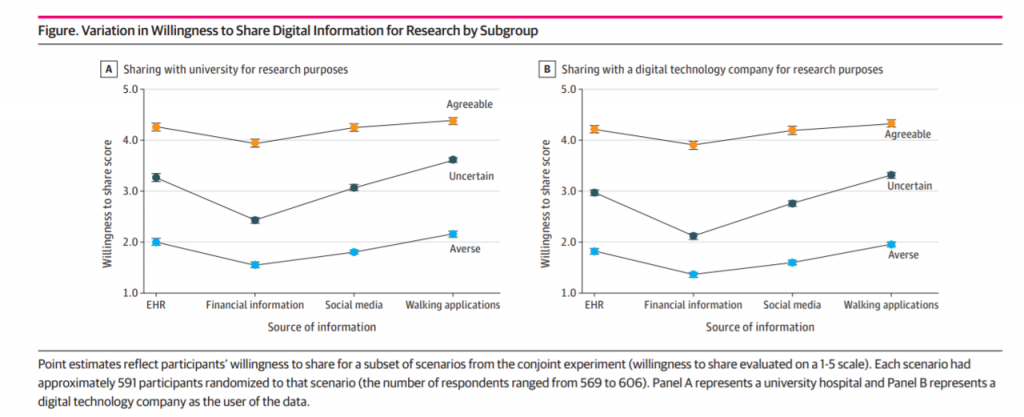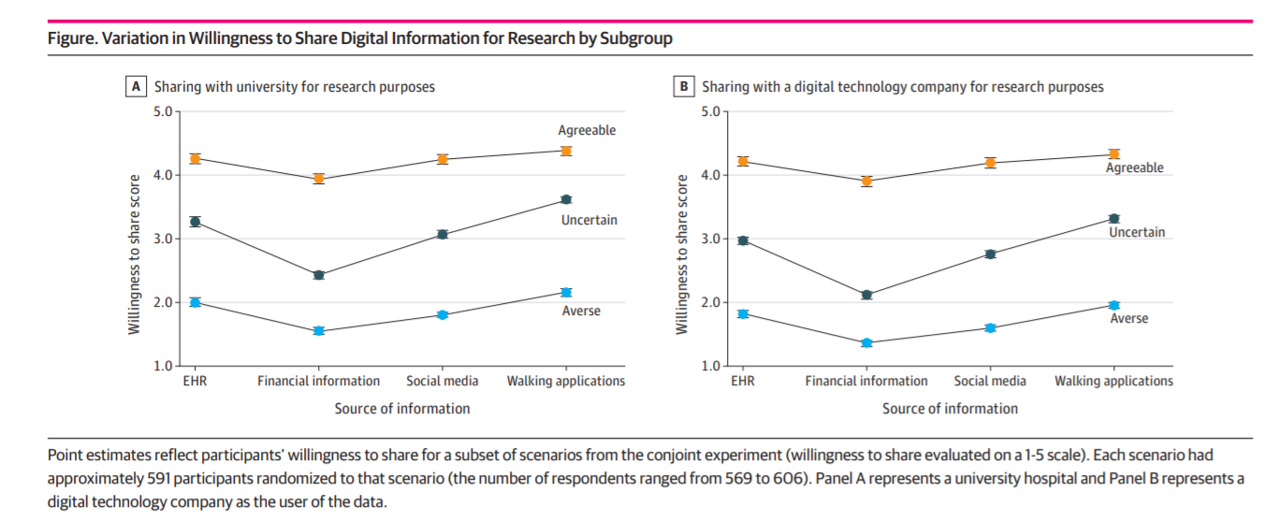Health is the cornerstone to our core needs, thereby the cornerstone to trust.” This was one lens on the latest 2022 Edelman Trust Barometer published earlier this month.
But trust is in short supply when it comes to consumers openness to share their personal information we learn through a new study published in JAMA, Consumer Willingness to Share Personal Digital Information for Health-Related Uses.
For some historical context, the authors (all affiliated with the University of Pennsylvania [medical school or Wharton (business school)] start with HIPAA, the Health Insurance Portability and Accountability Act which served up privacy protections based on the health information technology of the time. Remember that in 1996, there were no smartphones, mobile apps, or Internet clouds.
As these latter technologies developed and generated lots of digital data, researchers, clinicians, and third parties have mashed up the information for wellness and medical and other reasons that have had nothing to do with the context of health/care.
The study was conducted to assess consumers’ views on sharing personal data for health purposes. The survey was fielded in July 2020 (so a few months into the COVID-19 pandemic) among 3,543 respondents.
Top-line, people can have “strong views” about sharing information regardless about a specific use case. At the same time, the growing application of AI and personalized medicine requires the use of all kinds of personal information that extends well beyond claims data in the electronic health record.
 A few over-arching findings:
A few over-arching findings:
- Consumers’ views of sharing health data depend on context
- About one in two people would share regardless of context, compared with 33% opposed to most sharing.
- The demographics of sharers vary, shown in the table below. For example, white and higher-income populations were more likely less willing to share than people in racial ethnic minority groups or consumers earning lower incomes. {This finding differs from other studies finding more privacy-concerns; the authors of this study focused on nongovernmental uses of digital health information which they believe differentiated this finding from other studies where the concerned worried about governmental surveillance).
 Some additional more granular findings include:
Some additional more granular findings include:
- More people were willing to share information about their walking activity from phone apps compared with information coming out of their electronic health record (EHR)
- Compared with sharing health information from personal EHRs, people were less willing to share information about finances from banks, places they visit based on public camera shots, communications with people on social media, and Internet search engine histories
- People would be more willing to share their information with a university hospital than with a pharmaceutical or digital technology company
- Differences by disease were small except people appear to be less willing to share information related to depression and diabetes versus cancer, and more willing to share information about COVID-19.
The authors’ bottom-line was that, “With the lines between health and non-health information blurred more than ever, the traditional boundaries around different types of information may no longer be relevant.”
Health Populi’s Hot Points: In Here’s Looking at You: How Personal Health Information is Being Tracked and Used, a paper I wrote on behalf of the California Healthcare Foundation, I described the growing surveillance economy and its application for health and medical uses. I also addressed the opportunity for bad players to scrape various third-party data and use our personal information out-of-healthcare-context.
That was published in 2014, and eight years later, we have even more digital dust available for good (and not-so-much) generated through our phones, retail receipts, GPS, social check-ins, and other sources that have absolutely nothing to do with a medical visit — and, potentially, so much to do with our overall health and well-being.
 We yearn for personalization these days, yet most consumers tend to have an ambivalent embrace of technology with privacy concerns lurking as we swipe right (or left), check into social networks, show off our sourdough breads on Instagram — and so on.
We yearn for personalization these days, yet most consumers tend to have an ambivalent embrace of technology with privacy concerns lurking as we swipe right (or left), check into social networks, show off our sourdough breads on Instagram — and so on.
A new Ipsos survey of U.S. consumers asked, “do we want privacy or personalization” in the context of health and wellness. “Privacy wins, but so does personalization,” the study found. “In many ways,” Ipsos wrote, “this is the tension that shouldn’t be a tension. We should be able to get the customized benefits of a wearable, while also knowing where that data is and isn’t going….But that can cut both ways — all that data can demonstrate that you’re not taking care of yourself. People have good cause to be skeptical of the benefits and risks,” Ipsos reasoned.
So how do we reconcile a surveillance economy with the promise of personalized medicine that benefits every health citizen?
Some thoughts, though incomplete they may be (this is complicated stuff):
- Stakeholders involved in data should understand privacy by design principles
- Public policymakers must update privacy policies to address consumer data privacy, comprehensively. In the U.S., the patchwork quilt of privacy laws for the people is full of holes, with HIPAA, GINA, COPPA, and other regulations not well knitted together in this info-blurred era for health
- Be transparent and clear in stating privacy policies in plain and accessible language.
Check out these current sources on consumer-facing tech, trust, and health to continue your education on this fast-evolving challenge…
From the AMA, How smartphone apps can – and should – protect users- health info, Jan. 10, 2022
From Kaspersky, Telehealth take-up: the risks and opportunities, December 2021
From The American Journal of Managed Care and ABIM, Increasing Trust in Health Care, December 1 2021
From Microsoft, Accelerating healthcare AI innovation with Zero Trust technology, October 26, 2021
IAPP, Privacy by Design portal and access to the seminal Ann Cavoukian, PhD, paper on PbD





 I love sharing perspectives on what's shaping the future of health care, and appreciate the opportunity to be collaborating once again with Duke Corporate Education and a global client on 6th May. We'll be addressing some key pillars to consider in scenario planning such as growing consumerism in health care, technology (from AI to telehealth), climate change, and trust -- the key enabler for health engagement or dis-engagement and mis-information. I'm grateful to be affiliated with the corporate education provider
I love sharing perspectives on what's shaping the future of health care, and appreciate the opportunity to be collaborating once again with Duke Corporate Education and a global client on 6th May. We'll be addressing some key pillars to consider in scenario planning such as growing consumerism in health care, technology (from AI to telehealth), climate change, and trust -- the key enabler for health engagement or dis-engagement and mis-information. I'm grateful to be affiliated with the corporate education provider  Thank you FeedSpot for
Thank you FeedSpot for